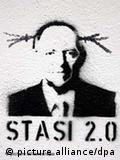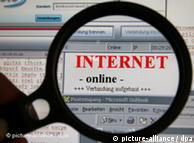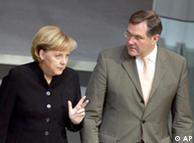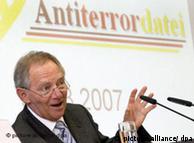from d.welle- German Anti-Terror..........
Terrorism | 25.09.2007
German Anti-Terror Measures Fight for Life as Opposition Grows
Germany's interior and defense ministries have been busy rolling out potential anti-terror measures over the past weeks. But experts believe government infighting and public opposition may kill off many of them.
Another day, another anti-terror plan. Two weeks after the foiling of what could have been the country's most devastating terrorist attacks, German politicians have presented a burgeoning list of counter-terrorism measures they hope will protect Germany and its citizens.
At present, Germany is in the process of debating, among other anti-terror issues, the use of spying software on computers, deadly force in the skies, increased surveillance in the cities and the collection of its citizens' biometric data.
Interior minister champions online searches
The use of spy software resurfaced as a potential anti-terror measure just days before the alleged attacks on targets in Germany were foiled. Interior Minister Wolfgang Schäuble, long a proponent of the online searches, announced his plans to send e-mails attached with Trojan horse software to suspected terrorists. Bildunterschrift: Some say Schäuble's plans resemble methods used by the Stasi, the East German secret police
Bildunterschrift: Some say Schäuble's plans resemble methods used by the Stasi, the East German secret police
Once opened, the software would secretly install itself onto a computer and send data to police computers as soon as the user went online. The program would also be able to monitor keystrokes, which would allow agents to track passwords used to call up information on external servers without the suspect realizing the search had taken place.
German politicians showed that they were divided largely along party lines on the issue.
Members of Chancellor Angela Merkel's Christian Democrats (CDU) and their Bavarian sister-party, the Christian Social Union (CSU), tend to be in favor Schäuble's plans, while the Social Democrats (SPD), with whom Merkel shares power, are inclined to reject them as an intrusion of privacy and an infringement of personal freedoms.
Spyware plan's survival depends on focus
Whether online searches are written into German law will largely depend on how politicians propose to use them, according to Jörg Hofmann, a German security analyst and author of a number of books on the threat of terrorism.
"This debate will continue on a political level as long as the emphasis remains on terrorism," Hofmann said. "However, once the debate spreads to include other online surveillance plans, then any possible agreement on the use of spy software would be severely undermined by increasing fears of widespread, non-terror-related use." Bildunterschrift: Großansicht des Bildes mit der Bildunterschrift: Data protection is an integral part of civil liberties
Bildunterschrift: Großansicht des Bildes mit der Bildunterschrift: Data protection is an integral part of civil liberties
Public opposition to the plan took to the streets over the weekend when some 8,000 protestors marched through Berlin in a demonstration against the use of spyware, the increase of surveillance cameras in public areas and other security proposals.
"The overall direction of the anti-terror measures is very unhealthy," a spokesman for Amnesty International's German branch said. "While protecting the citizens of the country, a government must make sure civil rights controls remain strict. Privacy should then be as important as protection. We watch to see if the responses are proportionate to the threat, and it clear in most of these proposals that this is not the case."
Germans wary of surveillance
Supporters of the new anti-terror measures may end up facing renewed opposition to their proposals, Hofmann added.
"I was not surprised by the recent public opposition to extra surveillance," he said. "The German government is uncomfortable with large-scale public opposition. It won't want to be seen going against the people, especially on an issue which stirs debate on a surveillance or police state. Germany's historical experience with this makes it a very touchy subject."
Germans of the past lived first under the oppressive police state created by the Nazis and then, for those living in East Germany after World War II, under communist state control. Unsurprisingly, today's Germans oppose increased powers which echo the policies of those times.
But the majority of the German population sees no problem with the introduction of online investigations. Some 58 percent of those polled in favour, while 36 percent rejected the searching of private computers, according to a recent Infratest survey.
If Germany did allow online investigations into hard drives, it would become the first EU country to do so.
Deadly force debate shot out of the sky
 Bildunterschrift: Großansicht des Bildes mit der Bildunterschrift: Defense Minister Jung said he'd order passenger planes to shoot if necessary
Bildunterschrift: Großansicht des Bildes mit der Bildunterschrift: Defense Minister Jung said he'd order passenger planes to shoot if necessary
In the wake of the foiled attacks in Germany, another discussion thought to have been concluded sprang to life again when Defense Minister Franz Josef Jung told Germany's Focus magazine that he would not abide by a Federal Constitutional Court ruling and would give the command to shoot down a hijacked passenger plane to prevent it from being used in a terrorist attack similar to the ones that occurred in the United States on Sept. 11, 2001.
In 2006, the court, Germany's highest, scrapped the controversial law allowing hijacked civilian planes to be shot down. It ruled that the law was an infringement on a passenger's rights to life and human dignity.
Merkel anger ends discussion
Again the coalition government was split down party lines. SPD leader Kurt Beck called Jung's behavior "disgraceful." Left party politician Petra Pau accused the minister of "playing God," and the free-market liberal FDP's Burkhard Hirsch said he was shocked that Jung would "disregard the ruling of the Constitutional Court and order that a crime be committed, if he deems it right." Bildunterschrift: Großansicht des Bildes mit der Bildunterschrift: Merkel was reportedly furious with Jung
Bildunterschrift: Großansicht des Bildes mit der Bildunterschrift: Merkel was reportedly furious with Jung
This time, however, Chancellor Merkel seems to have had the last word. She was described as being "furious" about Jung's statement and made it clear, at least on an official level, the debate was closed.
"The ruling of the Federal Constitutional Court against shooting down hijacked passenger planes makes Jung's statement that he would order it a moot point, he just wouldn't be able to do it," Hofmann said. "The debate has run its course. The court has ruled against it. Plus Chancellor Merkel moved quickly when the topic resurfaced to reprimand Jung and nip things in the bud. I don't predict this measure being approved any time soon."
Biometrics up and running despite opposition
In another move to increase security, Germany will start adding fingerprints to its biometric passports from Nov. 1. The radio-frequency identification (RFID) chip in the German biometric passport, which came into use in 2005, already includes facial recognition data.
 Bildunterschrift: Großansicht des Bildes mit der Bildunterschrift: Fingerprints will be added to the biometric passports
Bildunterschrift: Großansicht des Bildes mit der Bildunterschrift: Fingerprints will be added to the biometric passports
Opponents of the biometric system and a proposed biometric database accuse the federal and state governments of establishing the systems despite the public's privacy and security concerns and with little open debate.
Meanwhile, supporters say biometric passports create an unrivaled level of security and protection against the counterfeit identification papers often used by terrorists and other criminals.
"Many Germans see the benefits of this increased security and accept the collection of data," Hofmann said. "People have got used to this as part of life. Some, however, see this as part of the creation of a global surveillance structure where everybody's whereabouts are known. But whichever way you look at it, biometrics are a reality. It's a done deal."

Comments